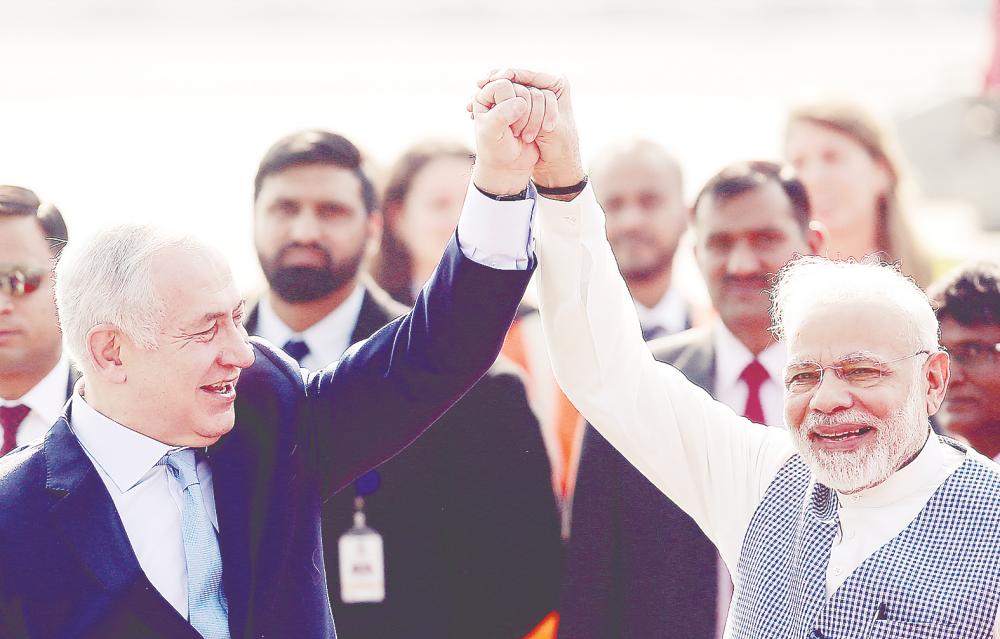IN a world where the moral high ground is as mythical as unicorns, Arundhati Roy, the acclaimed writer and unyielding activist, draws a line in the sand.
She is urging India to slam the brakes on its arms sales to Israel, cautioning that persisting in this bloody business will permanently tarnish India with the brush of the ongoing genocide in Gaza.
The backdrop to this urgent plea is nothing short of apocalyptic: Gaza, once a vibrant epicentre of life, is now reduced
to a wasteland, with around 40,000 Palestinians dead and countless others wounded or traumatised.
Civil society in India is growing increasingly restless, and for good reason. The government’s cozy relationship with Israel is under more scrutiny than ever.
A formidable letter landed on the desk of India’s Defence Ministry recently. Signed by an ensemble of India’s intellectual heavyweights – Supreme Court judges, bureaucrats and activists, including Roy – it demands an immediate halt to arms exports to Israel.
The letter’s stark language reflects the gravity of the situation: Any further complicity in arming Israel would be a blatant violation of international law, according to the preliminary findings of the International Court of Justice (ICJ).
State complicity in genocide is no small accusation. The timing could not be worse. Just over a month ago, reports emerged of Indian arms making their way to Israel, even as the ICJ hinted at Israel’s potential breaches of the Genocide Convention. The letter underscores the point: India must not contribute to a genocide being broadcast live to the world.
Among the signatories are notable figures like advocate Prashant Bhushan, senior advocate Mihir Desai and activist Harsh Mander.
They believe at least three Indian companies secured licences to export military hardware to Israel during this grim period. These licences, granted by the directorate-general of Foreign Trade and the Department of Defence Production, were for military and dual-use purposes.
“The ICJ has ruled that Israel is in violation of the Genocide Convention and is illegally occupying Palestinian territories. In light of these rulings, any supply of military material to Israel
would amount to a violation of India’s obligations under international humanitarian law,” reads the letter dated July 30.
United Nations (UN) experts, in a chilling chorus, have warned that weapon transfers to Israel could constitute grave human rights abuses. They have called for an immediate halt, cautioning against state complicity in potential international crimes, including genocide.
In her remarks, Roy did not mince words. She lamented India’s drift from its historical support for Palestinian rights. The bouquet of weapons sent to Israel, coupled with the dispatch of thousands of Indian construction workers to replace Palestinian labourers, marks a stark betrayal.
“India needs to stop the export of weapons to Israel and ensure the return of Indian workers sent to replace Palestinian workers. If it does not, it violates ICJ orders,” Roy asserted.
India’s arms dealings with Israel are not a recent phenomenon. They stretch back to the 1960s, with Israel providing military aid during India’s conflicts with China and Pakistan. The relationship, normalised in 1992, has blossomed into a strategic partnership under Prime Minister Narendra Modi. India now buys more Israeli weapons than any other country.
This military embrace has intensified in the past decade, with India’s purchase of Israeli weapons skyrocketing by 175% between 2015 and 2019.
Indian firms now co-produce Israeli arms, including assault rifles, sniper rifles, machine guns and drones. Defence analysts predict this could lead to mass production of Israeli weaponry in India. However, this burgeoning military-industrial complex is not without its critics. Trade unions have been vociferous in their opposition, decrying the moral bankruptcy of these partnerships.
“Israel has been conducting a genocide for months – killing students, teachers, researchers; and destroying schools, colleges and universities. Building academic ties with Israeli universities under these circumstances is morally reprehensible,” said Akash Bhattacharya, a leader with the All India Central Council of Trade Unions.
Despite these warnings, India has emerged as one of Israel’s staunchest allies since the Hamas-led attacks on southern Israel in October 2023. India’s abstention from the UN resolution calling for a ceasefire and its subsequent refusal to support an arms embargo on Israel highlight its unwavering support.
As the sands of Gaza continue to soak up the blood of its people, Roy’s call to action serves as a stark reminder: The choices nations make in times of conflict reveal their true character. Will India heed the call or will it forever bear the stain of complicity in a genocide? The world watches and waits.
The writer is an entrepreneur with a passion for politics and international affairs. As a world traveller, his global experiences enhance his photography and literary work, providing
unique insights and perspectives.
Comments: letters@thesundaily.com









